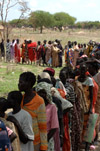
The international community has a significant role to play in addressing the myriad humanitarian problems plaguing southern Sudan, a half-decade after the signing of a peace agreement, or CPA, that officially ended hostilities between the North and the South. So says a report released today by 10 aid agencies, including Oxfam International. The authors write:
“Five years later, the peace agreement is extremely fragile and violence is again increasing. The humanitarian situation, already one of the worst in the world, is deteriorating; and in the eyes of most ordinary southerners, meaningful post-war development has been absent.”
Civilians continue to face daily threats to security; in 2009, more than 2,500 people were killed and 350,000 fled their homes from violence that egregiously targeted women and children. Disarmament efforts by the South Sudanese government have not created a sense of security among many communities, and the U.N. peacekeeping mission in Sudan has neglected its civilian protection mandate, the report said.
Food insecurity due to erratic rainfall in the past year contributed to the deteriorating humanitarian situation and highlighted the limited ability of humanitarian agencies to reach people in need.
Development indicators for South Sudan all remain far below basic standards, despite expectations of peace dividends, promised through the signing of the CPA:
“(…) for many ordinary people meaningful post-war development has been absent. The delivery of basic services such as schools, health clinics, and safe water, should have been a key peace dividend that helped build popular confidence in the CPA. Instead, service provision has been painfully slow, leading to mounting frustration.”
Policymakers would do well to take a look at the recommendations offered in the report, including a call for concerted international mediation between CPA parties to resolve issues relating to the referendum and its aftermath. The report also prescribes ways to prioritize civilian protection for both the government of southern Sudan and U.N. peacekeepers, including training U.N. personnel on its mandated protection responsibilities. Funding allocation for emergency assistance, basic service delivery, and the southern government should be made more flexible and have an eye toward the long-term by emphasizing support for local NGOs and local government structures.
The report makes clear that in this critical year for Sudan an incredible amount of work remains. The international community must firmly stand behind consequences for any of the political parties that take steps that put civilians in jeopardy.

